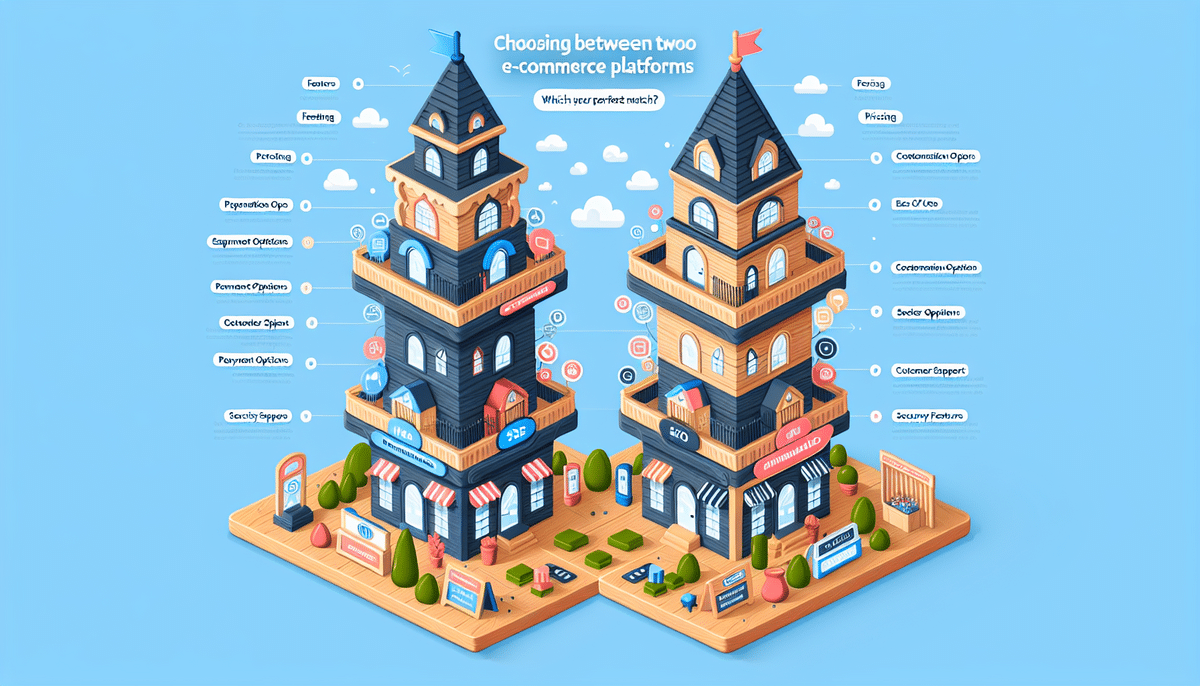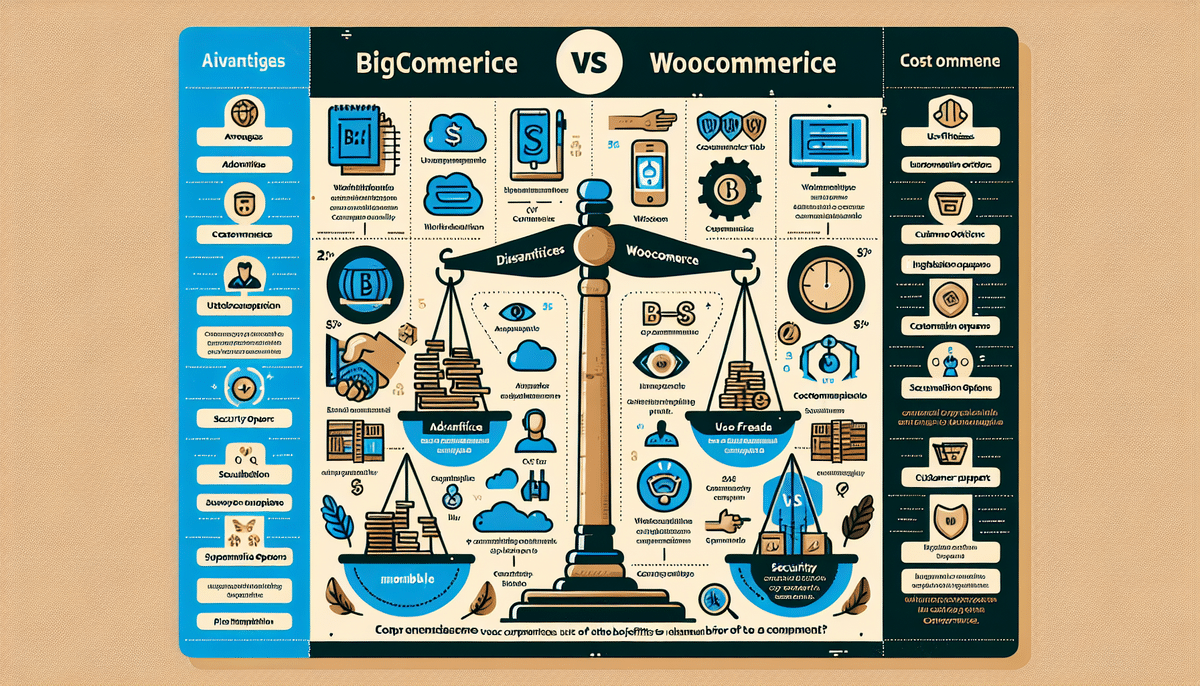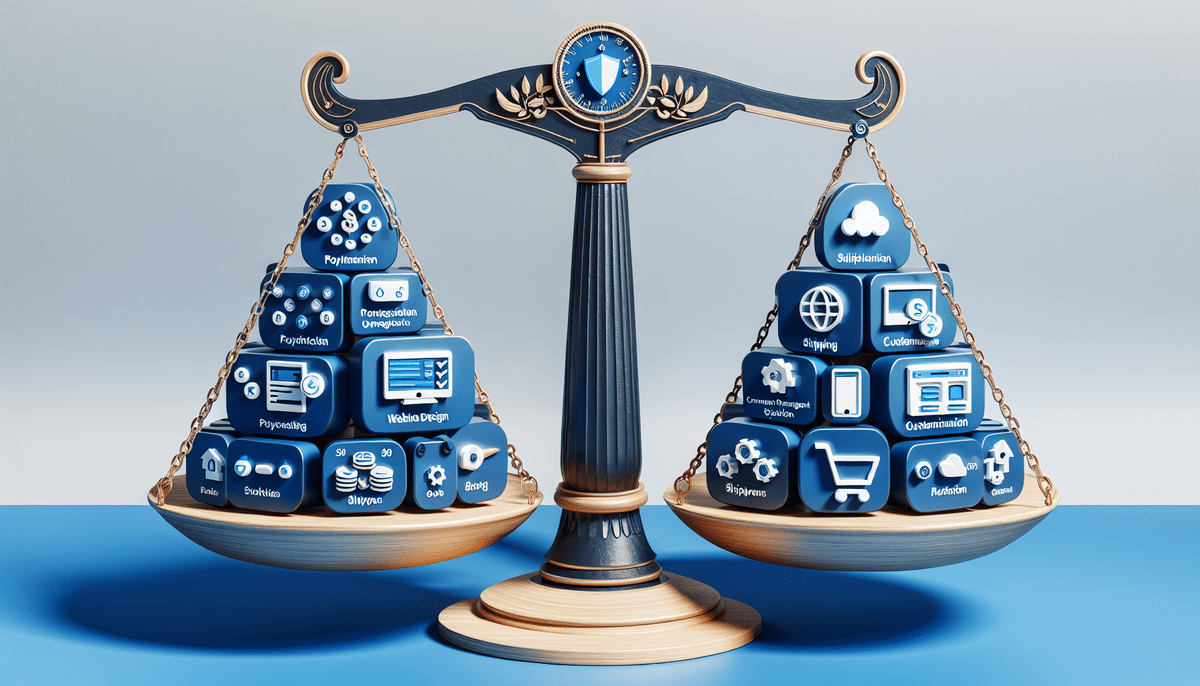BigCommerce vs Shopify: An In-Depth Comparison
Note: Choosing the right e-commerce platform is crucial for the success of your online business. In this comprehensive comparison, we'll analyze two leading platforms: BigCommerce and Shopify. We'll explore their pricing structures, features, ease of use, customization options, payment gateways, integrations, SEO capabilities, customer support, security features, and more. By the end of this guide, you'll be equipped with the knowledge to determine which platform aligns best with your business objectives.
Overview of BigCommerce and Shopify
BigCommerce and Shopify are two of the most popular e-commerce platforms available today, each offering a suite of tools designed to help businesses create and manage their online stores. BigCommerce is known for its robust built-in features and scalability, making it a favorite among growing businesses. Shopify, on the other hand, is celebrated for its user-friendly interface and extensive app ecosystem, catering to businesses of all sizes.
Both platforms support a wide range of industries and offer solutions for everything from small boutiques to large-scale enterprises. However, they differ in aspects such as pricing, customization capabilities, and the extent of built-in features, which we'll delve into in the following sections.
Pricing and Plans
Understanding the pricing structures of BigCommerce and Shopify is essential for budget planning and determining the best value for your business.
BigCommerce Pricing
- Standard Plan: $29.95/month
- Plus Plan: $79.95/month
- Pro Plan: $299.95/month
- Enterprise Plan: Custom pricing
BigCommerce's pricing includes a comprehensive set of features across all plans without additional transaction fees, making it appealing for businesses that prefer an all-inclusive approach.
Shopify Pricing
- Basic Shopify: $29/month
- Shopify: $79/month
- Advanced Shopify: $299/month
- Shopify Plus: Custom pricing
Shopify also offers a Lite plan at $9/month, which allows merchants to sell on social media and other platforms without a full online store. While Shopify's base plans are slightly cheaper, additional costs may arise from transaction fees and premium apps.
Source: Shopify Pricing, BigCommerce Pricing
Features and Customization
The feature sets and customization options offered by BigCommerce and Shopify are pivotal in tailoring your online store to meet specific business needs.
BigCommerce Features
- Advanced product customization with unlimited products
- Built-in SEO tools and marketing features
- No transaction fees on any plan
- Multi-channel selling (e.g., Amazon, eBay, Facebook)
- Comprehensive analytics and reporting
Shopify Features
- User-friendly store setup with an intuitive interface
- Extensive app store with over 4,000 apps
- Flexible payment gateway integrations
- Robust inventory management
- Responsive customer support
While both platforms offer essential e-commerce functionalities, BigCommerce stands out with its more extensive built-in features, potentially reducing the need for additional apps. Shopify's strength lies in its vast app ecosystem, providing flexibility to add specialized functionalities as needed.
Customization Options
BigCommerce offers a range of customization tools, including drag-and-drop page builders, custom themes, and advanced coding capabilities for those with technical expertise. Additionally, it allows for extensive customization of product fields and the checkout process, enabling businesses to create a tailored shopping experience.
Shopify provides a user-friendly customization interface with numerous themes and the ability to modify templates using Liquid, Shopify's templating language. While Shopify offers significant customization, some advanced features may require the use of third-party apps or developer assistance.
Ease of Use
Both platforms are designed to be user-friendly, but they cater to different levels of technical proficiency.
BigCommerce
BigCommerce's interface is straightforward, but its extensive feature set might present a steeper learning curve for beginners. However, it offers comprehensive documentation and support resources to assist users in navigating the platform.
Shopify
Shopify is renowned for its ease of use, making it an excellent choice for beginners. Its intuitive dashboard and guided setup process allow users to launch their stores quickly without requiring extensive technical knowledge.
Source: Shopify Blog
Payment Options and Integrations
Flexible payment options and seamless integrations are critical for providing a smooth customer experience and efficient store management.
Payment Gateways
Both BigCommerce and Shopify support a wide range of payment gateways, including major options like PayPal, Stripe, and Shopify Payments.
- BigCommerce: Supports over 65 payment gateways, including Apple Pay, Amazon Pay, and Venmo.
- Shopify: Supports over 100 payment gateways and offers its own Shopify Payments, which eliminates transaction fees for users.
Integrations
Integration capabilities extend the functionality of your e-commerce store by connecting with various third-party services.
- BigCommerce: Offers integrations with platforms like QuickBooks, Salesforce, and HubSpot, facilitating advanced business operations.
- Shopify: Features a vast app store with integrations for marketing, SEO, shipping, accounting, and more, allowing for extensive customization.
Source: BigCommerce vs Shopify Integrations
SEO and Marketing Tools
Effective SEO and marketing tools are essential for driving traffic and increasing sales.
BigCommerce SEO Capabilities
- Customizable URL structures
- Built-in Google AMP support
- Automatic sitemap generation
- Advanced SEO apps and integrations
Shopify SEO Capabilities
- Basic SEO tools such as meta tags and descriptions
- Automatic sitemap generation
- Integration with various SEO apps
- Mobile-responsive themes enhancing SEO performance
BigCommerce offers more advanced SEO features out of the box, which can be advantageous for businesses aiming for high search engine rankings without relying heavily on third-party apps.
Customer Support and Security
Reliable customer support and robust security measures are paramount for maintaining trust and ensuring smooth operations.
Customer Support
- BigCommerce: 24/7 support via phone, email, and live chat, along with a dedicated account manager for enterprise users.
- Shopify: 24/7 support through phone, email, live chat, and an extensive help center with community forums.
Security Features
- Both platforms offer PCI compliance, SSL certificates, and secure hosting to protect customer data.
- BigCommerce: Includes advanced security features like fraud detection and prevention, and automatic security updates.
- Shopify: Provides secure payment processing and access to various security apps for enhanced protection.
Source: BigCommerce Security, Shopify Security
Pros and Cons
BigCommerce Pros:
- Advanced customization options
- Unlimited product listings
- Comprehensive built-in features
- Dedicated account management for enterprise plans
- No transaction fees
BigCommerce Cons:
- Higher pricing compared to Shopify
- Steeper learning curve for beginners
Shopify Pros:
- Highly intuitive and user-friendly interface
- Extensive app store with over 4,000 apps
- Lower entry-level pricing
- Excellent customer support
- Flexible payment options with Shopify Payments
Shopify Cons:
- Additional costs for premium apps
- Limited built-in features compared to BigCommerce
- Transaction fees apply unless using Shopify Payments
Case Studies of Businesses Using BigCommerce and Shopify
Real-world examples illustrate how businesses leverage BigCommerce and Shopify to achieve their goals.
BigCommerce Users
- Skullcandy: Utilizes BigCommerce for its extensive product range and robust customization capabilities.
- Toyota: Implements BigCommerce to manage its large-scale online sales and integrations.
- Ben & Jerry's: Chooses BigCommerce for its seamless multi-channel selling features.
Shopify Users
- Kylie Cosmetics: Employs Shopify for its user-friendly interface and scalable solutions.
- Gymshark: Uses Shopify to handle high traffic volumes and extensive product listings.
- Allbirds: Opts for Shopify to benefit from its robust app ecosystem and customization options.
Source: BigCommerce Case Studies, Shopify Case Studies
Final Verdict: Which Platform is Better for Your Business?
Both BigCommerce and Shopify are powerful e-commerce platforms that offer a range of features tailored to different business needs. Your choice between the two should be guided by your specific requirements:
- Choose BigCommerce if:
- You need advanced built-in features without relying heavily on third-party apps.
- You have a large inventory and require unlimited product listings.
- Customization and scalability are top priorities for your growing business.
- You prefer an all-inclusive pricing model without additional transaction fees.
- Choose Shopify if:
- You prioritize ease of use and a quick setup process.
- You want access to a vast array of apps and integrations for specialized functionalities.
- You are starting with a smaller budget and seek lower entry-level pricing.
- You value a highly intuitive interface and robust customer support.
Ultimately, both platforms are capable of supporting a successful online store. It’s advisable to take advantage of their free trials to explore their interfaces and features firsthand before making a decision.






















